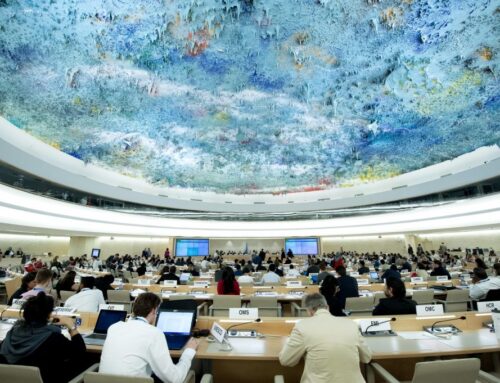56th Session of the HRC – A historic session for the rights of the child!
Child Rights Connect actively followed and advocated in this year’s June session of the Human Rights Council, which started on 18 June and wrapped up on 12 July. The June Session allowed for an opportunity to continue joint advocacy efforts with members and partners to ensure child rights mainstreaming in addition, the Child Rights Connect Working Group on education led extremely successful advocacy efforts to secure a new initiative for a new optional protocol to the Convention on the Rights of the Child on the rights to early childhood education, free pre-primary education and free secondary education. Read here the overview of the main highlights.
- The Council establishes a process to develop a new optional protocol to the Convention on the Rights of the Child on the rights to early childhood education, free pre-primary education and free secondary education!
Thanks to the efforts from the Child Rights Connect WG on education, a resolution (HRC/56/L.8) was adopted by consensus on 10 July at the HRC, setting up the process to develop a new optional protocol to the Convention on the Rights of the Child on the rights to early childhood education, free pre-primary education and free secondary education This is the result of a year of advocacy by Child Rights Connect’s Working Group on Education which culminated with the leadership of the Permanent Missions of the Dominican Republic, Luxembourg and Siera Leonne as penholders of the resolution. The resolution was supported by a 28 States and counting.
The resolution calls for the establishment of an open-ended intergovernmental working group “to explore the possibility of, elaborating and submitting” a draft fourth Optional Protocol to the Human Rights Council to the Convention on the Rights of the Child, with the following elements:
- The recognition that the right to education includes early childhood care and education;
- That State parties to the OP engage themselves to make public pre-primary education free and available to all (at least for one year) as well as secondary education
- For reporting on the OP to be integrated into the general CRC reporting
In addition, this is a landmark resolution when it comes to child participation! This resolution sets up for the first time the necessary process to ensure that the views of children are included on the substance of the proposed OP by the Working Group.
The Children’s Advisory Team of Child Rights Connect played a crutial part in this process! During the last year, several child advisors were consulted and actively engaged on the initiative. To name a few of the advocacy efforts that the Team worked on, the child advisors wrote a letter to the High Commissioner for human rights to request his support, which can be read here. To promote the initiative, they also took part in a video to explain why the right to education and an Optional Protocol on this right matters to them. These efforts highlight the indispensable role children themselves play in advocating for their rights, ensuring that their voices are not only heard but also drive meaningful change on the global stage.
Two child advisors, Catarina (17, Brazil) and Freja (13, Canada) were invited to personally support the adoption of the resolution during the 56th Human Rights Council Session in Geneva. The girls participated in a side event where they discussed the importance of the initiative together with the Permanent representatives of the Dominican Republic, Luxemburg and Sierra Leonne. Catarina and Freja also met with relevant stakeholders and participated in the informal negotiations on the content of the resolution. Their participation was essential in ensuring the successful adoption of the resolution with consensus!
With the resolution now successfully adopted, Child Rights Connect is committed to taking the next next steps in collaboration with the Working Group on education to ensure that the established Working Group not only engages with children but does so in a way that is active, meaningful, and deeply respectful of their perspectives. We will work to guarantee that the draft version of the Optional Protocol (OP) reflects children’s views to the fullest extent possible, embedding their insights and experiences into the very foundation of this international framework. By doing so, we aim to empower children as true stakeholders in shaping the future of their right to education.
- Mainstreaming children’s rights in resolutions on civil and political rights: resolution on peaceful protests
As part of our efforts to mainstream children’s rights in resolutions that have been traditionally blind to an age and child perspective, we decided to undertake advocacy on the biennial resolution on the promotion and protection of the human rights in the context of peaceful protests. Our advocacy included 3 main key asks:
- Strengthen the existing request in the resolution on the “need for additional guidance for law enforcement with regards to child participation”, including by referencing new developments such as the UNICEF’s updated guidance on the facilitation of child participation in peaceful protests by law enforcement officials.
- Ensure that when states provide training to law enforcement trainingthis includes a child rights lens;
- Ensure that girl human rights defenders in addition to women, when discussing gender-based discrimination and safeguarding in the context of peaceful protests.
Despite pushback during negotiations, these recommendations were mostly incorporated with 1) a stronger requesting the need to “integrate the full consideration of the rights of the child in guidance for law enforcement”, 2) calling for “gender-, disability- and age-responsive training of officials exercising law enforcement” and 3) including girl human rights defenders!
Through our work on this resolution, we have made positive strides in the acknowledgement of child human rights defenders and prevented potential regressions regarding girls involved in protests.
3. Ensuring high standards in an unexpected initiative on safety of the child in the digital environment
During this session, an unexpected initiative was put forward by Egypt, Kazakhstan, Malaysia, Senegal, Singapore and the United Arab Emirates. The Resolution dealt with Safety of the Child in the Digital Environment and Child Rights Connect, together with its members, undertook advocacy efforts to bring the resolution in line with current standards, including General Comment 25 of the Committee on the Rights of the Child.
The Resolution aims at strengthening cooperation among States and requests the creation of 5 regional workshops to develop a framework for online safety for children. It highlights the importance of promoting and protecting the safety of children in the digital environment, in line with international human rights standards, including the Convention on the Rights of the Child.
For Child Rights Connect and its members, it was key to ensure the Resolution would have a broader understanding of what safety online entails. For us, safety online implies that all children rights are respected and fulfilled online and children can exercise all their rights online safely. It was fundamental to ensure that safety online would not lead to a limitation of children civil and political rights, among others, in the digital environment.
In that sense, thanks to the advocacy efforts of Child Rights Connect, its members, and close coordination with States during the whole Human Rights Council session, the following changes to the original draft Resolution were achieved.
- States were clearly recognized as primary duty-bearers of children’s rights. The resolution reiterates that the State is the actor having the main obligation to respect, protect and fulfill all children’s rights in the digital environment, followed and supported by other stakeholders, such as businesses or families.
- A reference to the work of the Committee on the Rights of the Child (CRC) was included.
- The responsibility of business actors was strengthened. The resolution was strengthened to ensure that States called on business to ensure their responsibility to respect children’s rights and pay particular attention to the accessible design and operation of the digital environment and the safeguarding of the child’s safety, protection and privacy from arbitrary or unlawful interference. Another paragraph also called for the establishment and implementation of regulatory frameworks, industry codes, and terms of service that uphold the highest standards of ethics, privacy, and safety, ensuring respect for children’s rights in all aspects of their technological products and services.
- A reference to strengthen the rights of children to digital literacy and education was included, while ensuring that the burden on safety does not fall on children.
- The resolution demands States to adopt and implement legislation on children rights on the digital environment rather than just focusing on policy making.
- Language around the access to justice was strengthened.
After this busy 56th session, we are actively preparing and coordinating with our members and partners for strong advocacy at the September session which will take place from 9 September until 9 October. Our main focus there will be to raise awareness and amplify the notion of civil and political rights of children.



Leave A Comment